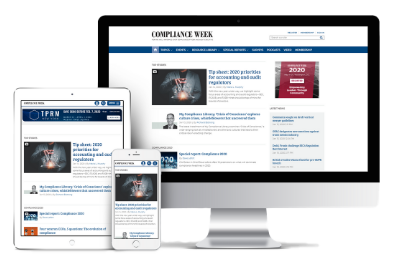- Home
- About CW
-
Topics
- Back to parent navigation item
- Topics
- Accounting & Auditing
- AI
- AML
- Anti-Bribery
- Boards & Shareholders
- Culture
- ESG/Social Responsibility
- Ethics & Culture
- Europe
- Financial Services
- Internal Controls
- Regulatory Enforcement
- Regulatory Policy
- Risk Management
- Sanctions
- Surveys & Benchmarking
- Supply Chain
- Third Party Risk
- Whistleblowers
- Opinion
- Events
- Research
- Awards
-
CW Connect
- Back to parent navigation item
- CW Connect
- Sign In
- Apply
- Membership
Two years in, GDPR defined by mixed signals, unbalanced enforcement
By  Neil Hodge2020-05-27T15:49:00
Neil Hodge2020-05-27T15:49:00
It’s been two years since the EU’s GDPR went into effect, and we still don’t know how lingering questions about compliance—as well as non-compliance—will be answered going forward.
Related articles
-
Article
Anatomy of a 90% fine reduction: How BA saved $200M on GDPR penalty
2020-10-16T19:44:00Z By Neil Hodge
The U.K. Information Commissioner’s Office agreed to slash its intended GDPR fine for British Airways from £183.39 million (U.S. $230 million) to just £20 million (U.S. $26 million). What was behind the massive reduction?
-
 Article
ArticleCompanies face greater risk as GDPR class actions emerge
2020-09-24T18:00:00Z By Neil Hodge
In the past month three of the world’s largest tech firms have been hit with legal actions that could lead to billion-dollar damages suits for alleged violations of the GDPR. Neil Hodge explores the trend and what to expect moving forward.
-
 Article
ArticleHow far is too far with employee monitoring? Barclays case could offer litmus
2020-08-20T14:54:00Z By Neil Hodge
The U.K. Information Commissioner’s Office is investigating allegations that Barclays Bank had effectively been spying on employees by using an intrusive software system that monitored workers’ activity.
More from GDPR
-
 Article
ArticleFour years of GDPR: New tech testing data privacy law’s longevity?
2022-05-25T15:52:00Z By Neil Hodge
It has been four years since the European Union’s flagship data privacy legislation came into force, but concerns are already being raised about whether the General Data Protection Regulation is being outpaced by technological developments and their use of data.
-
 Article
ArticleDissatisfaction with GDPR pushing EU countries toward local laws
2021-12-21T15:18:00Z By Neil Hodge
So far, Europe’s wide-reaching data privacy rules have seemingly failed to curb Big Tech firms’ use and abuse of citizens’ personal data. As a result, some EU data regulators are pursuing their own investigations—often through other legislation.
-
 Article
ArticleCWE panel: GDPR ‘the start of a culture of data protection’
2021-11-15T21:50:00Z By Neil Hodge
Belgian Data Protection Authority head David Stevens and Member of European Parliament Axel Voss discussed ways the General Data Protection Regulation could be improved for the future during a keynote at CW’s virtual Europe event.
- Terms and Conditions
- Privacy Policy
- Do Not Sell My Info
- © 2025 Compliance Week
Site powered by Webvision Cloud



